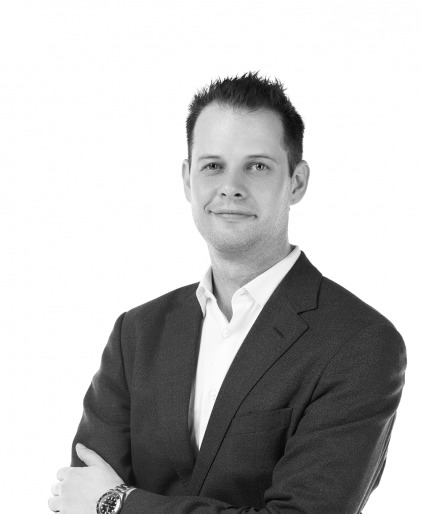As part of our work, we have the privilege to speak with many inspiring innovators. Although the business community usually focuses on companies, pitches, and valuations—and less on the innovator—we thought it would be interesting to learn a bit more about the people behind healthcare innovation.
In this series, we’re sharing some of our conversations with innovators in a condensed format: eight questions and eight answers about their experience, their opinions, and their learnings.
The latest conversation is with Kieran Walters, Director of Strategy at the World Mosquito Program, a not-for-profit initiative that’s protecting communities around the world from mosquito-borne diseases. They have established projects in 11 countries and reached more than 8 million people as of September 2021. The technology has received positive media coverage by the BBC, Bloomberg, CNN, Nature, The Atlantic, The World Economic Forum and many others. The interview is conducted by Maiko Hirai, Geneva based Associate Partner at McKinsey & Company.
Maiko: What’s your story and how did you become an innovator in healthcare?
Kieran: Unlike many of my talented colleagues, I don’t come from a medical or academic background. I spent most of my career working as a management consultant advising global companies across a range of industry sectors, mainly focusing on natural-resources. However, a few years ago I was asked to help solve some complex challenges involving scaling of a promising health intervention and this led me to the work that I am doing now. It became an obsession for me once I realized just how much of a problem mosquito-borne diseases are, and that severe dengue is a leading cause of hospitalization and death in Asia and Latin America, particularly amongst young children. Having two young daughters of my own made this deeply personal for me.
Looking back on my career I feel very fortunate to be working in health. I often find that many of the challenges we face are similar to those observed in other sectors: for example, how can we rapidly scale technologies at the lowest-possible cost? Our success also largely depends on building trust when working closely with communities. It is an absolute strategic imperative for us. As a wise CEO once told me, it starts and it stops with integrity.
Maiko: Tell us the story of the World Mosquito Program, what led to its formation, and what are some of the biggest challenges you face in your organization?
Kieran: We exist to protect the global community from mosquito-borne viruses. We do this using a safe and natural bacteria called Wolbachia to prevent the transmission of pathogens such as dengue, Zika, chikungunya, and yellow fever.
Wolbachia is an extremely common bacteria that is found naturally in around 50 percent of insect species, including in some mosquitoes, fruit flies, moths, dragonflies and butterflies. In principle we are breeding 'good' mosquitoes. The mosquitoes carrying Wolbachia (the ‘good’ mosquitoes) are much less likely to spread viruses from person to person.
Our founder and CEO, Professor Scott O’Neill, first started working on Wolbachia and dengue back in 1980. This led to the creation of the Eliminate Dengue Program, now known as the World Mosquito Program (WMP). A lot has been achieved since those early days, with pilot projects first taking place in Australia and Vietnam, followed by Brazil and Indonesia. We are now operating in 11 countries and have already reached more than 8 million people to help protect them from mosquito-borne diseases. In terms of challenges, we take a first-principles approach to problem solving and like to break complex problems down into their most simple parts. So, our scaling priorities right now are in production, distribution and productivity. We also need to keep the lights on, so fundraising is a big focus for our organization. This also includes working on affordable financing mechanisms that one day we hope can be used to help fund the implementation of Wolbachia technologies globally.
Maiko: How much of a problem is dengue and what is the trend you see during the COVID-19 pandemic
Kieran: Dengue is a huge problem; sometimes people refer to it as a permanent pandemic. It is the world’s fastest-growing mosquito-borne disease, and about 40 percent of the global human population is at risk from getting the virus. The WHO identified dengue as one of the top ten global health threats in 2019 due to these factors. Its spread is also being exacerbated by climate change and increasing levels of urbanization throughout the tropics. We know that outbreaks of dengue can strain health systems and COVID-19 in particular has shown us what can happen when health system capacity is at breaking point.
Maiko: You had a remarkable result from a recent trial in Indonesia. What can you tell us about that?
The results from our gold-standard randomized controlled trial in Indonesia showed a 77 percent reduction in dengue cases and an 86 percent reduction in dengue hospitalizations. These results were published recently in the New England Journal of Medicine and have received a lot of attention, including a recent segment published by the World Economic Forum. It’s a huge milestone for us, our partners in Yogyakarta, and most importantly, for people that are impacted by dengue outbreaks.
Maiko: How does this compare to other methods of control, and is it safe?
Kieran: Wolbachia is a common, natural insect bacteria found in around 50 percent of insects. The method used does not involve any genetic modification and, once applied, it is long lasting. Independent risk analyses have been conducted on the Wolbachia method and concluded that there is negligible risk associated with the release of Wolbachia-carrying mosquitoes. This is the lowest possible rating.
We always obtain regulatory approval from government in all of the countries where we are releasing mosquitoes. In addition to this, we don’t release Wolbachia mosquitoes without community support.
The most common response to outbreaks tends to be the use of insecticide spraying to kill mosquitoes; however, such methods are becoming less effective over time due to resistance. The growing use of plastic is also very problematic because mosquitoes love to breed in containers that hold water, so clean up of breeding sites is always important. We see the use of Wolbachia technologies as complementary to other existing vector control methods. We need to do everything possible to help combat this growing problem.
Maiko: You have demonstrated the ability to innovate quickly. How have you managed that, and which technology trends are you focused on at the moment?
Kieran: The nature of what we do means that we are always innovating. We are driven by a sense of urgency to scale this important technology and help protect communities around the world from these terrible diseases as soon as possible. But of course, we also acknowledge that novel technologies take considerable time to be adopted widely, even with a strong body of evidence. We are very systematic and rigorous in how we test and pilot our new technologies.
We also like to partner with other organizations that are great innovators. A good example is in insect rearing where we are working with InnovaFeed, a leading French biotechnology company and insect producer, who is advising us on the scaling of our production technologies.
We are also increasingly focusing on automation, not only in the production of mosquitoes but also in the way that we release them. Our partnership with WeRobotics enabled us to conduct the first-ever drone trial to combat dengue in Fiji. Although this work is in its early stages, we hope that the automation technologies used will also be applicable to ground-based modes of transport.
Maiko: I heard you push data driven analytical decision making. How do you harness data to help you to find answers?
Kieran: We are always analyzing and interpreting data due to our research activities. A good example of this involves capturing data as part of our field implementation projects—everything from the geographic coordinates of mosquito release points through to the level of Wolbachia establishment in mosquitoes that are found in our traps. This not only helps us to optimize our plans, but also provides us with important information that we use to monitor the success of our field activities.
We also use data a lot to understand our serviceable market. Some of the data we look at relates to disease burden, population density, elevation, temperature, and other information specific to countries to inform our strategic decision making. We conduct a lot of spatial analysis when planning specific deployments across defined boundaries and this work is increasingly being automated. We recently collaborated with Microsoft using Azure and machine learning technology to model population areas and determine the best release sites for our disease-fighting mosquitoes.
Maiko: What does the future hold for the World Mosquito Program?

Kieran: The successful trial result in Indonesia has been a key turning point. We are increasingly gaining the confidence to scale this promising health intervention across large urban populations worldwide. Although this will require national-level policy commitments from governments, we are confident that the adoption rate of Wolbachia technologies will continue to rise.
When we engage with stakeholders at the highest levels about Wolbachia technologies, we also want to ensure that we actively engage with the communities that we serve. This can involve their participation in implementation activities, through the use of easily deployable mosquito kits. Scaling of this technology will require strong levels of community acceptance to succeed.
We exist solely to help improve the health of others and I personally feel very grateful to be working on something that can have such a positive impact on the world. This is what gets me out of bed in the morning. For perhaps the first time in 50 years, dengue looks like a problem we can solve together.
Kieran Walters has spent most of his career working with organizations in the natural resources, infrastructure, manufacturing, professional services, and not-for-profit sectors. He specializes in helping organizations to operate more effectively and reduce complexity, and has advised companies in the areas of strategy, project and investment governance, business process improvement, operating-model design, and organizational effectiveness. Kieran was previously the Project Governance Lead for BHP 's Olympic Dam expansion and is a former partner of IG Partners (acquired by Cyient).
